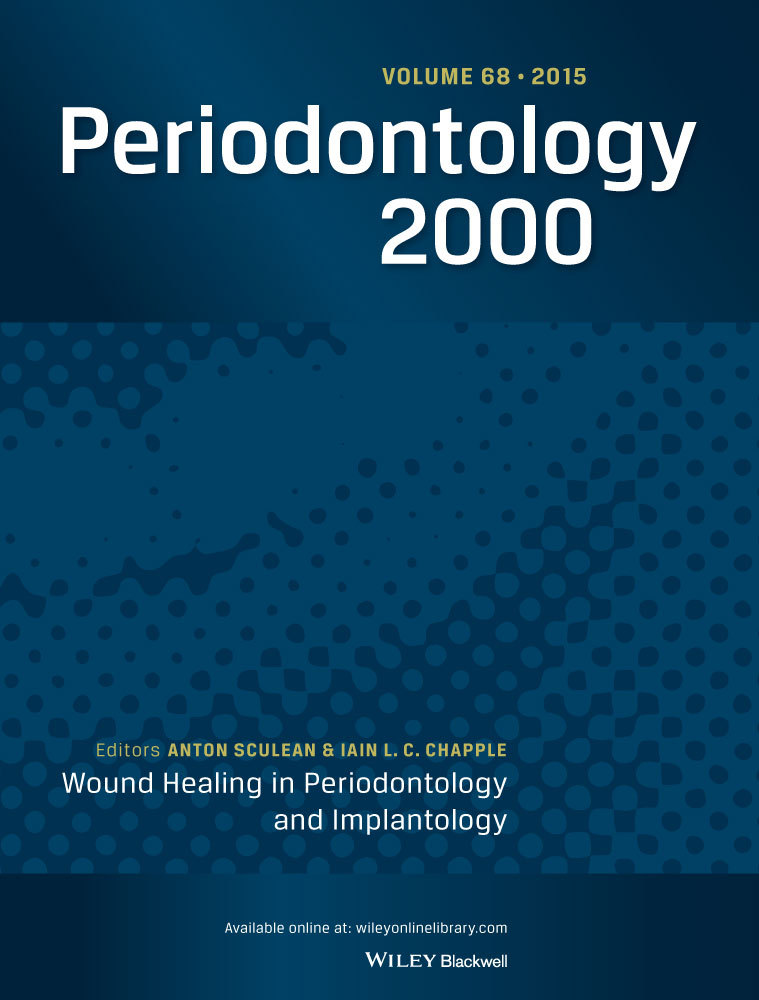用于预防/治疗种植体周围疾病的新兴当地提供的抗菌和免疫调节方法。
IF 17.5
1区 医学
Q1 DENTISTRY, ORAL SURGERY & MEDICINE
引用次数: 0
摘要
种植体周围疾病是发生在易感宿主体内的生态失调介导的炎症性疾病。因此,抗菌剂和免疫调节剂可能是治疗此类疾病的辅助措施。本叙述性综述的目的是检查现有证据,并评估新出现的局部提供抗菌和免疫调节方法在预防/治疗种植体周围疾病方面的有效性。在PubMed图书馆中进行了电子搜索,以确定用于预防/治疗种植体周围疾病的传统和新兴的当地提供的抗菌和免疫调节方法。本文对这些方法在预防和治疗种植体周围疾病中的作用进行了综述。使用传统的局部给药抗菌剂作为非手术或手术治疗种植体周围疾病的辅助手段已被证明在一定程度上是安全有效的。然而,证据有限,因此无法就日常使用这些药物治疗这些疾病得出明确的结论/建议。同样,关于传统免疫调节方法的现有证据很少,因此无法就其用于治疗这些疾病的日常使用得出确切的结论/建议。在新兴的抗菌剂和免疫调节策略中,氩等离子体和激光似乎分别为预防和治疗种植体周围疾病提供了好处。在对预防/治疗种植体周围疾病的新的局部递送和免疫调节方法的理解和潜力方面取得了重大进展。然而,由于缺乏对已知递送系统所提供的生物活性的控制,以及缺乏一致的非临床和临床数据,它们的临床应用仍然受到限制。必须提高工业界的认识,以开发可行的药物/工具,以提高预防和治疗策略的效力。本文章由计算机程序翻译,如有差异,请以英文原文为准。
Emerging locally delivered antimicrobial and immunomodulatory approaches for the prevention/treatment of peri-implant diseases.
Peri-implant diseases are dysbiosis-mediated inflammatory disorders that occur in susceptible hosts. Antimicrobials and immunomodulatory agents therefore might be pertinent as adjunctive measures in the treatment of such disorders. The aim of this narrative review was to examine the existing evidence and assess the effectiveness of emerging locally delivered antimicrobial and immunomodulatory approaches for the prevention/treatment of peri-implant diseases. An electronic search in the PubMed library was carried out to identify traditional and emerging locally delivered antimicrobial and immunomodulatory approaches for the prevention/treatment of peri-implant diseases. A narrative review was conducted to shed light on the role of these approaches to prevent and treat peri-implant diseases. The use of traditional locally delivered antimicrobials as an adjunct to the nonsurgical or surgical treatment of peri-implant diseases has been shown to be safe and effective to a certain extent. Nevertheless, the body of evidence is limited, which precludes the drawing of firm conclusions/recommendations on their daily use for the treatment of these disorders. Likewise, the existing evidence on traditional immunomodulatory approaches is scarce, and so firm conclusions/recommendations on their daily use for the treatment of these disorders cannot be made. Among the emerging antimicrobials and immunomodulatory strategies, argon plasma and lasers seem to offer benefits for the prevention and treatment of peri-implant diseases, respectively. Significant advances have been made in the understanding and potential of novel locally delivered and immunomodulatory approaches for the prevention/treatment of peri-implant diseases. Nevertheless, their clinical application is still limited by a lack of control over the bioactivity afforded by the known delivery systems and the scarcity of consistent nonclinical and clinical data. Awareness must be raised on the part of the industry to develop feasible agents/tools to enhance the efficacy of preventive and therapeutic strategies.
求助全文
通过发布文献求助,成功后即可免费获取论文全文。
去求助
来源期刊

Periodontology 2000
医学-牙科与口腔外科
CiteScore
34.10
自引率
2.20%
发文量
62
审稿时长
>12 weeks
期刊介绍:
Periodontology 2000 is a series of monographs designed for periodontists and general practitioners interested in periodontics. The editorial board selects significant topics and distinguished scientists and clinicians for each monograph. Serving as a valuable supplement to existing periodontal journals, three monographs are published annually, contributing specialized insights to the field.
 求助内容:
求助内容: 应助结果提醒方式:
应助结果提醒方式:


